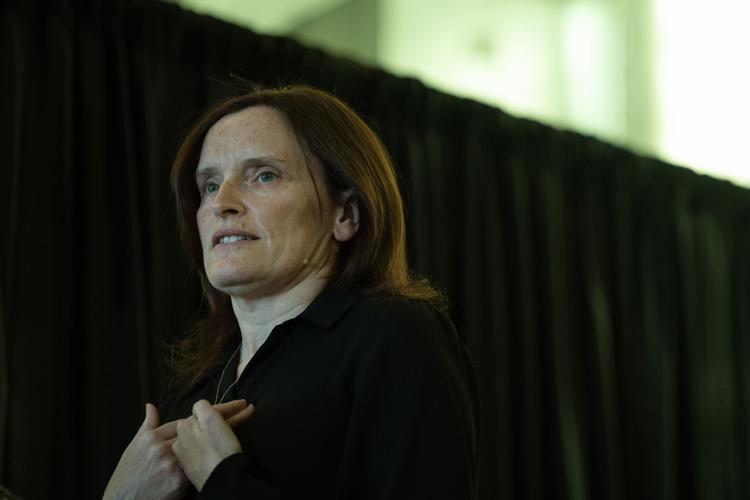The final frontiers’ space junk problem has a Denver-based solution

Lt. Gov. Dianne Primavera holds the large scissors along with, from left, Astroscale U.S. President and managing director Ron Lopez, executive Vice President Dr. Clare Martin and Astroscale Holdings founder & CEO Nobu Okada, during the ribbon cutting at the grand opening of Astroscale U.S. Inc.’s headquarters on Sunday, April 16, 2023, in Denver, Colo. (Timothy Hurst/Denver Gazette)
Timothy Hurst/The Denver Gazette
The final frontier has a junk problem, and Astroscale is working to change that. Founded and headquartered in Tokyo, Japan, the company celebrated the grand opening of its United States headquarters at 2201 S. Delaware St., Denver, Sunday afternoon.
The location will house 50 of Astroscale’s roughly 60 U.S. based employees and features a mission command center and design and testing labs. Colorado plays home to the largest aerospace market in terms of jobs per capita, which convinced Astroscale to select the south/central Denver location.
The metro Denver area plays home to giants like Lockheed Martin, Ball Aerospace and Northrup Grumman, but also hosts a robust network of smaller space companies of which Astroscale is a part of.
Founder Mitsunobu Okada felt quite emotional while delivering remarks Sunday and reflected on the 35-year history of his path to space sustainability. The start of Okada’s journey began at Space Camp in Alabama, where he met the first Japanese astronaut, Mamoru Mohri. Mohri would send Okada messages like “space is where you shine.”
“I never thought I would be standing in the new U.S. office of a company I started,” Okada said. “Ten years ago, I realized space debris already made the space environment unsustainable and no one had a solution for the problem.”
Indeed, NASA estimates there are roughly 500,000 objects between 1 and 10 cm in diameter, and over 25,000 with a diameter over 10 cm. Even seemingly small objects such as these can pose a huge risk to spacecraft and humans. The U.S Department of Defense’s global space surveillance network tracks over 27,000 objects, according to NASA.
Astroscale hopes to make a dent in that orbiting debris field via its End-of-Life Services by Astroscale (ELSA) program. The first demonstration, ELSA-d, consists of two spacecraft, a servicer and a client, which will model Astroscale’s plans to clear debris. The client craft, the smaller of the two, will pretend to be space debris, which will then be cleared by the larger craft as a proof of concept.
“Hearing about this work is encouraging,” Lt. Gov. Dianne Primavera said. “Knowing that innovative servicing technologies are being developed and tested right here in Denver is just one more example of how Colorado is a global leader in aerospace.”
Reusable space technology is not a new concept, beginning as far back as the 1950s with the X-15 rocket airplane program. In the 1960s, the U.S. Air Force studied semi-reusable spacecraft and in the late 1960s and into the 1970s, NASA began to develop the space shuttle. The shuttle would be the first reusable spacecraft, though the launch system was not. Two solid rocket boosters and a massive fuel tank were expended during launch.
Today, companies like SpaceX and Blue Origin have developed fully reusable launch systems in their Falcon 9 and New Shepard rockets. But many satellites remain single use and after their missions are complete, simply orbit the earth, occasionally burning up in the atmosphere.
“We are building a servicing ecosystem shifting away from the throwaway culture that is so prominent in the way we’ve done space to date,” Dr. Clare Martin, Astroscale’s executive vice president, said. “We’re moving towards a more circular space economy and we are doing that here, in this amazing building.”






